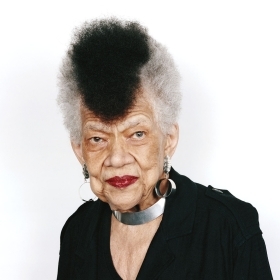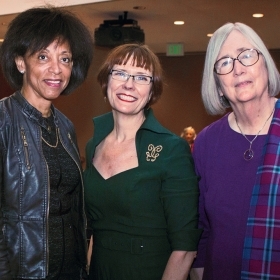On Sept. 1, 2015, Marseille “Mars” Allen ’01 moved to Flint, Mich. It was about 16 months after officials started the flow of Flint River water to city residents—the headwaters of a public health crisis that would soon spill over into unimaginable scope. By Mars’s moving day, it was clear that the water was tainted. “They had sent out boil-water alerts because of the bacteria,” she says. “But no one was talking about lead.” The very next day, Virginia Tech Professor Marc Edwards, an expert on municipal water quality, issued a report warning that the water’s corrosiveness was causing lead to leach into the water supply. (Michigan’s Department of Environmental Quality disputed that report, among others.)
Soon, Mars had rashes on her skin. Her back was still burning when she was interviewed for this story in April. In spite of the tragedy she has witnessed since her arrival in Flint, the Detroit native has decided to stay put. “I think there was a reason I was put there,” she says.
This notion started to crystalize in January, when Mars joined a friend handing out water one Saturday afternoon, the same day that President Obama declared a state of emergency in Flint. “I remember this older white woman came over to me, and I put a couple cases of water in her backseat,” Mars says. “She had tears in her eyes, and she hugged me. She hugged me as if she couldn’t ever let me go. And she said, ‘I got grandbabies, and I just don’t know what to do.’ I knew right then and there that I had to do something.”
By the next morning, Mars had launched a campaign on the crowdfunding site GoFundMe, aiming to raise $1,000. “That would get me two pallets of water,” she says, enough to load up her car a few times and hand-deliver water to people who couldn’t leave their homes because of age or illness or other restrictions. Pamm McNeil ’82, president of Wellesley Alumnae of African Descent (WAAD), was the first to donate. “After that, it was a snowball effect,” Mars says.
As of this writing, 1,248 donors have supported Water for Flint—WFF, closing in on $60,000. Five Wellesley sisters quickly stepped in to take over campaign logistics, allowing Mars to clock an occasional night of sleep and still attend to her day job as an agent for the Department of Corrections. Colleagues within the department have provided tremendous assistance, including thousands of water bottles and volunteers to help distribute them, door to door, even on the most bitter of winter days. The United Auto Workers Union, too, has delivered a reliable stream of volunteers for every distribution. The collective efforts have placed more than 100,000 bottles of water, plus baby wipes and other necessities, into the hands of some of the city’s most vulnerable individuals.
“There were so many people who can’t get to Flint who want to be a part of the solution,” Mars says. “That’s why I started this. As long as people continue to give and there’s a case of water to buy, I’ll buy it.”
In April, at the 45th-anniversary celebration of Harambee House, Ethos awarded Marseille Allen the Black Excellence Award in recognition of her work in Flint and for the Warriors Trust Fund, which she helped found to support combat veterans.







We ask that those who engage in Wellesley magazine's online community act with honesty, integrity, and respect. (Remember the honor code, alums?) We reserve the right to remove comments by impersonators or comments that are not civil and relevant to the subject at hand. By posting here, you are permitting Wellesley magazine to edit and republish your comment in all media. Please remember that all posts are public.